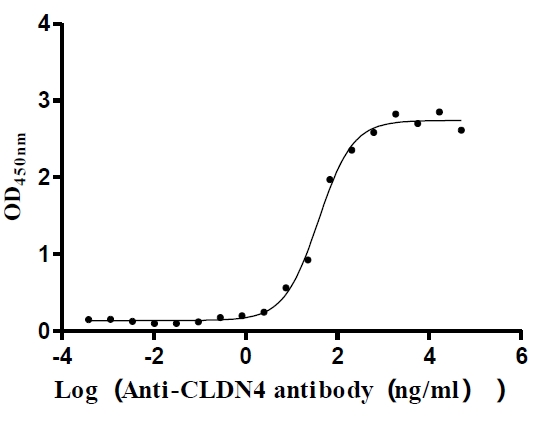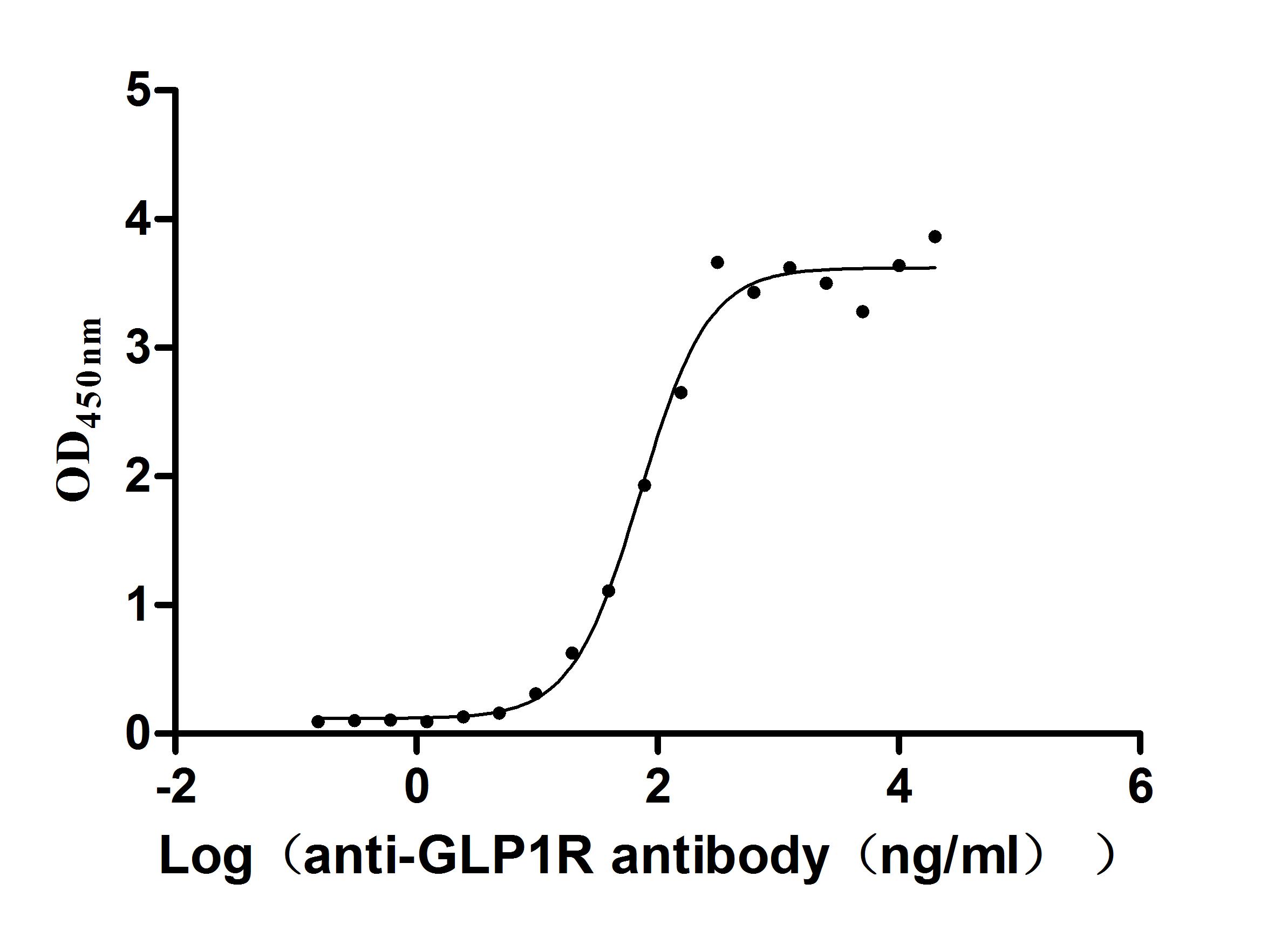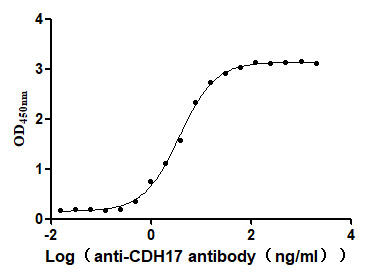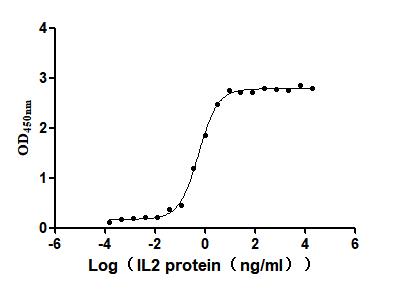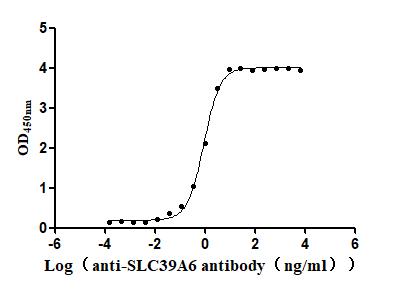Recombinant Human Fibroblast growth factor 19 (FGF19)
-
货号:CSB-YP008624HU
-
规格:
-
来源:Yeast
-
其他:
-
货号:CSB-EP008624HU
-
规格:
-
来源:E.coli
-
其他:
-
货号:CSB-EP008624HU-B
-
规格:
-
来源:E.coli
-
共轭:Avi-tag Biotinylated
E. coli biotin ligase (BirA) is highly specific in covalently attaching biotin to the 15 amino acid AviTag peptide. This recombinant protein was biotinylated in vivo by AviTag-BirA technology, which method is BriA catalyzes amide linkage between the biotin and the specific lysine of the AviTag.
-
其他:
-
货号:CSB-BP008624HU
-
规格:
-
来源:Baculovirus
-
其他:
-
货号:CSB-MP008624HU
-
规格:
-
来源:Mammalian cell
-
其他:
产品详情
-
纯度:>85% (SDS-PAGE)
-
基因名:
-
Uniprot No.:
-
别名:FGF 19; FGF-19; FGF15; FGF19; FGF19_HUMAN; Fibroblast growth factor 15; Fibroblast growth factor 19
-
种属:Homo sapiens (Human)
-
蛋白长度:Full Length of Mature Protein
-
表达区域:25-216
-
氨基酸序列LAFSDA GPHVHYGWGD PIRLRHLYTS GPHGLSSCFL RIRADGVVDC ARGQSAHSLL EIKAVALRTV AIKGVHSVRY LCMGADGKMQ GLLQYSEEDC AFEEEIRPDG YNVYRSEKHR LPVSLSSAKQ RQLYKNRGFL PLSHFLPMLP MVPEEPEDLR GHLESDMFSS PLETDSMDPF GLVTGLEAVR SPSFEK
-
蛋白标签:Tag type will be determined during the manufacturing process.
The tag type will be determined during production process. If you have specified tag type, please tell us and we will develop the specified tag preferentially. -
产品提供形式:Lyophilized powder
Note: We will preferentially ship the format that we have in stock, however, if you have any special requirement for the format, please remark your requirement when placing the order, we will prepare according to your demand. -
复溶:We recommend that this vial be briefly centrifuged prior to opening to bring the contents to the bottom. Please reconstitute protein in deionized sterile water to a concentration of 0.1-1.0 mg/mL.We recommend to add 5-50% of glycerol (final concentration) and aliquot for long-term storage at -20℃/-80℃. Our default final concentration of glycerol is 50%. Customers could use it as reference.
-
储存条件:Store at -20°C/-80°C upon receipt, aliquoting is necessary for mutiple use. Avoid repeated freeze-thaw cycles.
-
保质期:The shelf life is related to many factors, storage state, buffer ingredients, storage temperature and the stability of the protein itself.
Generally, the shelf life of liquid form is 6 months at -20°C/-80°C. The shelf life of lyophilized form is 12 months at -20°C/-80°C. -
货期:Delivery time may differ from different purchasing way or location, please kindly consult your local distributors for specific delivery time.Note: All of our proteins are default shipped with normal blue ice packs, if you request to ship with dry ice, please communicate with us in advance and extra fees will be charged.
-
注意事项:Repeated freezing and thawing is not recommended. Store working aliquots at 4°C for up to one week.
-
Datasheet :Please contact us to get it.
相关产品
靶点详情
-
功能:Involved in the suppression of bile acid biosynthesis through down-regulation of CYP7A1 expression, following positive regulation of the JNK and ERK1/2 cascades. Stimulates glucose uptake in adipocytes. Activity requires the presence of KLB and FGFR4.
-
基因功能参考文献:
- Study showed that FGF19 amplification is a genetic event in Chinese lung squamous cell carcinoma (LSCC) patients, with a frequency of 37.5%. FGF19 amplified LSCC cells express relatively higher levels of FGF19 mRNA expression, and downregulation of FGF19 expression can induce significant cell killing effects in vitro and in vivo. PMID: 28906590
- FGFR4/FGF19 autocrine signaling mediates the survival of a subset of basal-like breast cancer cells PMID: 27192118
- FGF19 copy number may increase in hepatocellular carcinoma accompanying a complete response to sorafenib treatment PMID: 27384874
- Study demonstrates that elevated FGF19 expression or hyperactivation of FGF19/FGFR4 signaling in hepatocellular carcinoma cells is one of the main mechanisms of sorafenib resistance. PMID: 28069043
- This is the first study to elucidate FGF19/FGFR4 signaling in favor of hepatocellular carcinoma cells developing from fatty liver PMID: 27447573
- High expression of FGF19 is associated with hepatocellular carcinoma. PMID: 26498355
- Findings show that FGF19 provides a cytoprotective role against ER stress by activating a FGFR4-GSK3beta-Nrf2 signaling cascade, suggesting targeting this signaling node as a candidate therapeutic regimen for hepatocellular carcinoma (HCC) management. PMID: 28951455
- Fibroblast growth factor 19 levels in human portal blood are higher than in arterial blood. Fibroblast growth factor 19 is released by the portal-drained viscera under fasted steady state conditions. PMID: 28003563
- Intestinal sensing of highly elevated levels of conjugated bile acids in blood promotes FGF15/FGF19 signaling, reducing hepatic bile acid synthesis and modulating bile acid transporters. PMID: 28498614
- serum FGF19 and FGF21 and hepatic Klotho expression are inversely associated with hepatic damage in children with NAFLD PMID: 23840612
- Administering FGF19, or suitable mimetic, as a pharmacological intervention to increase circulating levels of FGF19 and suppress BA synthesis by inhibiting CYP7A1 gene expression is likely to provide therapeutic benefits for many PBC patients PMID: 28570655
- Amplification of FGF19 was validated in independent LSCC samples. Furthermore, FGF19 stimulated LSCC cell growth in vitro. These data implicate FGF19 as a potential driver gene in LSCC with clinic characteristics as smoking. PMID: 26943773
- FGF19 is able to enhance migration and invasion abilities of gastric cancer cells. PMID: 27053348
- Bile acid and FGF19 levels increased after Roux-en-Y bypass, but not after intensive medial management in type 2 diabetic subjects who achieved similar improvement in glycemic control. PMID: 26259981
- FGF19 correlates with severity of liver disease and can potentially serve as an indicator of chronic cholestatic liver injury. PMID: 26293907
- Study shows that FGF19 can be secreted and promotes ovarian cancer progression such as proliferation and invasion by activating FGFR4. PMID: 26323668
- we suggest that considerable mechanistic differences exist between humans and mice with regard to the nuclear receptors controlling the VitA-FGF15/19 axis. PMID: 26723851
- Suggest a potential connection between gallbladder cholangiocyte-derived FGF19 and bile acid metabolism that could lead to metabolic dysregulation following cholecystectomy. PMID: 26256900
- discusses current knowledge of the complex biology of the endocrine FGFs. PMID: 26567701
- FGF-19 increment after OGL was positively associated with age, and negatively associated with abnormal glucose regulation and statin treatment PMID: 26343925
- KL methylation is a characteristic of many breast cancer cases . However, the resulting or associated perturbation in FGFR4 expression, similar to FGF19, could be utilized as a biomarker for poor prognosis PMID: 26152288
- The pathogenesis of intestinal failure associated liver disease is uncertain, we therefore investigated the role of FGF19 and pro-inflammatory cytokines has on this disease state. PMID: 25595885
- In this review, we have reported the altered expression of FGF19 in non-alcoholic fatty liver disease and hepatocellular carcinoma; we find limited information on the role of FGF19 in other liver diseases PMID: 25547779
- In mice with humanized livers, expression of an FGF19 transgene corrects bile acid signaling defects, resulting in normalization of bile acid synthesis, the bile acid pool, and liver size. PMID: 26028580
- The data suggest that FGF19/FGF21 circulating levels and hepatic gene expression of the associated signaling pathway are significantly dysregulated in type 2 diabetes. PMID: 25664662
- Describe a nontumorigenic FGF19 variant, M70, which regulates bile acid metabolism and, through inhibition of bile acid synthesis/reduction of excess hepatic bile acid accumulation, protects mice from cholestatic liver injury. PMID: 25080475
- obesity appears as the predominant determinant of the abnormalities in FGF21 and FGF19 levels. Opposite changes in beta-Klotho expression in fat and liver indicate potential tissue-specific alterations in the responsiveness to endocrine FGFs in obesity PMID: 24813368
- FGF19 levels were reduced in non-diabetic obese subjects as compared to lean controls and obese type 2 diabetic subjects. PMID: 24841294
- Fibroblast growth factor 19 might be associated with biochemical recurrence after radical prostatectomy by promoting cell proliferation and epithelial-mesenchymal transition of prostate cancer PMID: 25854696
- In hepatocellular carcinoma, FGF19 amplifications, known to activate Wnt signaling, were mutually exclusive with CTNNB1 and AXIN1 mutations, and significantly associated with cirrhosis. PMID: 24798001
- FGF19 expression is not associated with lymph node metastasis and locally invasive characteristics of the tumor in colorectal cancers PMID: 23803094
- Reduced fibroblast growth factor 19 is a feature of bile acid diarrhea. PMID: 23981126
- [review] While FGF19 is a negative feedback regulator of bile acid metabolism and can circulate as a hormone, emerging evidence has showed its autocrine or exocrine function. PMID: 24827712
- FGF19 stimulates tumor progression by activating the STAT3 pathway. PMID: 24728076
- Reduced serum FGF19 levels could be involved in the pathophysiology of gestational diabetes mellitus, while increased serum FGF21 levels could be a compensatory response to this disease. PMID: 24260557
- Quantification of FGF19 expression appears to provide valuable prognostic information in breast cancer PMID: 24248542
- Fasting serum FGF19 levels were decreased in Chinese subjects with IFG and inversely associated with fasting glucose levels. PMID: 23628619
- These results suggest that SREBP-2 negatively regulates the FXR-mediated transcriptional activation of the FGF19 gene in human intestinal cells. PMID: 24321096
- Serum FGF19 is associated with the presence and severity of coronary artery disease in a Chinese population. PMID: 23940810
- The specificity of hFGF19 signaling is greatly altered in a mouse model system. PMID: 23064887
- FGF19 protein expression might be an effective predictor of early recurrence and a marker for poor prognosis of hepatocellular carcinoma. PMID: 23456506
- FGF19 (fibroblast growth factor 19) as a novel target gene for activating transcription factor 4 in response to endoplasmic reticulum stress PMID: 23205607
- A decrease in fasting FGF19 levels is associated with the development of non-alcoholic fatty liver disease in obese adolescents. PMID: 23329754
- HNF4alpha and LRH-1 promote active transcription histone marks on the Cyp7a1 promoter that are reversed by FGF19 in a SHP-dependent manner PMID: 23038264
- These results suggest that FGF19 is transcriptionally activated through multiple Farnesoid X receptor-responsive elements in the promoter region PMID: 22561792
- Differential specificity of endocrine FGF19 and FGF21 to FGFR1 and FGFR4 in complex with KLB. PMID: 22442730
- The FGF19 effect on APOA was attenuated by transfection of primary hepatocytes with siRNA against the FGF19 receptor 4 (FGFR4). PMID: 22267484
- Baseline serum FGF-19 levels are significantly lower in obese patients with type 2 diabetes and is at least partially dependent upon nutritional status, but is not related to glucose metabolism or insulin sensitivity parameters. PMID: 21574752
- Mouse Fgf15 and human FGF19 play key roles in enterohepatic signaling, regulation of liver bile acid biosynthesis, gallbladder motility and metabolic homeostasis PMID: 22396169
- FGF-19 levels are low in type 2 diabetic patients with metabolic syndrome. PMID: 22166511
显示更多
收起更多
-
亚细胞定位:Secreted.
-
蛋白家族:Heparin-binding growth factors family
-
组织特异性:Expressed in fetal brain, cartilage, retina, and adult gall bladder.
-
数据库链接:
HGNC: 3675
OMIM: 603891
KEGG: hsa:9965
STRING: 9606.ENSP00000294312
UniGene: Hs.249200
Most popular with customers
-
Recombinant Human Claudin-4 (CLDN4)-VLPs (Active)
Express system: Mammalian cell
Species: Homo sapiens (Human)
-
Recombinant Human Glucagon-like peptide 1 receptor (GLP1R), partial (Active)
Express system: Mammalian cell
Species: Homo sapiens (Human)
-
Recombinant Human Cadherin-17 (CDH17), partial (Active)
Express system: Mammalian cell
Species: Homo sapiens (Human)
-
Recombinant Human Interleukin-2 (IL2) (Active)
Express system: Mammalian cell
Species: Homo sapiens (Human)
-
Recombinant Macaca fascicularis Zinc transporter ZIP6 isoform X1(SLC39A6),partial (Active)
Express system: Baculovirus
Species: Macaca fascicularis (Crab-eating macaque) (Cynomolgus monkey)


